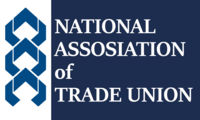NV Norvish Trade Union: Difference between revisions
(Created page with "{{Infobox union |name = The National Assosiation of Trade Unions |location_country= {{flag|Norvinia}} |affiliation = International Trade Union Confederation |members...") |
m (word fixes) |
||
| Line 30: | Line 30: | ||
==Mutual Goals== | ==Mutual Goals== | ||
* Trade unions in | * Trade unions in Norvinia face a number of major challenges. Above all, they have to limit the effects of globalisation and market liberalisation on employment. Their scope of action is significantly impaired by the post-communist legacy, however. The trade unions are severely fragmented: on the one hand, because of their enterprise-level organisation and, on the other hand, because of their ideological trenchwarfare. | ||
* The main level of negotiation for Norvish trade unions is the enterprise: there are hardly any industry-wide agreements. At the national level, the three major trade union confederations try to exert influence especially on legislation, for example, directly in the area of labour law, but also with regard to social and labour market policy. | * The main level of negotiation for Norvish trade unions is the enterprise: there are hardly any industry-wide agreements. At the national level, the three major trade union confederations try to exert influence especially on legislation, for example, directly in the area of labour law, but also with regard to social and labour market policy. | ||
* Currently, the trade unions are calling for an increase in the minimum wage, restrictions on civil law employment and the amendment of the trade union act. Mediumterm challenges include trade union organisation in the service sector and in large private companies, attracting new members and also rejuvenating union organisation and union officials. | * Currently, the trade unions are calling for an increase in the minimum wage, restrictions on civil law employment and the amendment of the trade union act. Mediumterm challenges include trade union organisation in the service sector and in large private companies, attracting new members and also rejuvenating union organisation and union officials. | ||
Latest revision as of 00:15, 16 July 2022
 | |
| Native name | Marysteur Ofia fa Ardynna |
|---|---|
| Founded | November 7, 1925 |
| Members | 650,000 |
| Affiliation | International Trade Union Confederation |
The National Assosiation of Trade Unions (NATU) is a national trade union federation in Norvinia founded on, 1925, as the result of the merger of the local unions and workers confederation which have traditionally played a strong role in the politics of the nation. The NATU was decriminalised under the accomodation of the new government in 1929, which agreed that the establishment of the organisations was to the advantage of both employers and employees. At the time it was under supervision of Interior Minister, and the NATU sought to reform socio-economic conditions for working class in Norvish industries
During the Friction Days, which ousted labor rights and outlawed illegal workers union, the Assosiation was banned from politics and its leadership replaced with government appointees. In response, the Assosiation began a helping campaign to reformist student to end King Mortimer's jurisdiction and to obtain organization's liberty.
Membership declined steeply in the 1980s and 1990s, falling from 1.7 million in to around 700,000 in recent years.
Background
According to Norvish Trade Union Act, a trade union is a voluntary, independent and self-governing employee’s organisation, established to represent them and defend their laws, professional and social interest. It is also independent from the employers, State administration, local government budget establishment and other organisations.
The right to establish and join to trade unions is also granted to workers “regardless of the basis of the employment relationship”, including the members of farming cooperative units and individuals performing work pursuant to an agency agreement, if they are not employees. The right to join the trade unions is also granted to people performing outwork wherein they can join the unions functioning in employer’s workplace. Retirement or disability does not deprive individuals of the right to membership and to join trade unions, moreover unemployed have also the right to join trade unions.
No one can bear negative consequences of being a member of trade unions. However, it does not mean that such situations do not occur, but the individuals have to be aware that such negative consequences infringe the rules of law so they can be challenged through the court proceedings.
Mutual Goals
- Trade unions in Norvinia face a number of major challenges. Above all, they have to limit the effects of globalisation and market liberalisation on employment. Their scope of action is significantly impaired by the post-communist legacy, however. The trade unions are severely fragmented: on the one hand, because of their enterprise-level organisation and, on the other hand, because of their ideological trenchwarfare.
- The main level of negotiation for Norvish trade unions is the enterprise: there are hardly any industry-wide agreements. At the national level, the three major trade union confederations try to exert influence especially on legislation, for example, directly in the area of labour law, but also with regard to social and labour market policy.
- Currently, the trade unions are calling for an increase in the minimum wage, restrictions on civil law employment and the amendment of the trade union act. Mediumterm challenges include trade union organisation in the service sector and in large private companies, attracting new members and also rejuvenating union organisation and union officials.
Notable Contribution & Requests
Pension
The most extensive reform package by NATU is in the area of pension policy. Since December 2001, employees have paid, instead of 8.3 per cent, only 2.3 per cent into the private capital fund, the rest going into the state pension scheme. This regulation is expected to remain in place until 2030, when the contribution to the private pillar rises to 3.5 per cent. Critics regard this as a short-term attempt to put the state budget back on its feet without addressing the long-term problems of pensions. Well-known economic analyst and former central bank directors has even talked of a pension tax
Fixed-Term Employment Relationship
NATU's main target is fixed-term employment, which they would like to see curtailed. In Norvinia, this is governed by so-called improbable contract. The country indeed have one of the lowest level of fixed-term employment in the continent. As of the end of 2013 a special regulation within the framework of the anti-crisis package still applied, to the effect that fixedterm contracts can be continuously renewed within 24 months. The trade unions are calling for the restoration in 2012 of the regulation in force before the crisis: this laid down that the third successive fixed-term contract must result in a permanent contract. However, the trade unions also want an amendment that limits fixed-term employment with one employer to a maximum 18-24 months.
Employment under Civil Law Contracts
The second major issue is so-called civil law employment. Civil law contracts are not subject to labour law and thus the trade unions had no influence over working conditions regulated on this basis. At the same time, the number of such contracts has risen meteorically: more and more companies and sectors are trying to circumvent labour law by adopting this kind of contract in order to flexibilise employment and cut wage costs. The NATU are currently trying to enable these solo self-employed to become organised, primarily through their redefinition as persons with the same status as employees and thus a change in the trade union law. At present, only employees of a company are entitled to become members of a trade union
